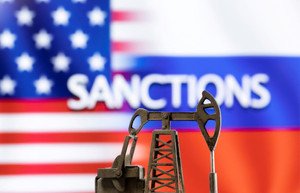US to impose sanctions on Russian oil fleet and traders, document shows
Published by Global Banking & Finance Review®
Posted on January 10, 2025
3 min readLast updated: January 27, 2026

Published by Global Banking & Finance Review®
Posted on January 10, 2025
3 min readLast updated: January 27, 2026

The US plans to impose sanctions on Russia's oil sector, affecting 180 vessels and major companies, causing a 3% rise in global oil prices.
By Nidhi Verma and Dmitry Zhdannikov
NEW DELHI/LONDON (Reuters) -The United States will impose some of the harshest sanctions yet on Russia's oil industry, according to a purported U.S. Treasury document circulating among traders in Europe and Asia that drove global oil prices 3% higher on Friday.
Some 180 vessels, dozens of traders, two major oil companies and some senior Russian oil executives, are designated in the sanctions, reports of which pushed global oil prices above $80 per barrel. [O/R].
Reuters could not immediately verify the veracity of the document and the U.S. Treasury Department did not immediately respond to a request for comment.
The sanctions, imposed on Russia for its war in Ukraine, would cause severe disruption of Russian oil exports to its major buyers India and China, four sources in Russian oil trade and three Indian refining sources said.
Refiners in India and China became the biggest buyers of Russian crude exports after the U.S., the European Union and their allies imposed sanctions on Russia's energy industry after Russia invaded Ukraine in 2022. Russia pumps around 10% of global oil supply.
Russian companies have adapted by buying their own fleet of tankers and insuring them inside Russia rather than via Western ship insurance.
Washington will impose sanctions on two oil majors Gazprom Neft and Surgutneftegaz and ship insurance providers Ingosstrakh and Alfastrakhovanie that cover most of ships supplying Russian oil to India, the document showed.
Until now, hundreds of ships and many Russian oil traders have escaped the harshest U.S. sanctions as the Biden administration sought to strike a balance between the case for tighter measures and the risk of a global oil price rally.
President-elect Donald Trump, who takes office later this month, has promised to stop the war in Ukraine. Harsher sanctions on Russian oil exports could give Trump more leverage in future peace talks as Moscow depends on oil exports to sustain its economy and fund the conflict.
Indian refiners will refrain from taking Russian oil in tankers under sanctions or in ships insured by Russian insurers that are under sanctions, the Indian refining sources said, asking not to be named.
According to the document, the U.S. Treasury would allow a transition period to March 12, allowing some energy-related transactions to be completed.
One of the Indian refining sources said new sanctions could push prices for Russian oil below $60 per barrel, at which point Western shippers and insurers will be able to transport the barrels under a price cap mechanism imposed by the West.
Gazprom Neft and Surgutneftegaz export together around 800,000 barrels per day (bpd) of oil.
Leading Russian oil exporters Rosneft and Lukoil have so far avoided the harshest U.S. sanctions.
During his previous term as president, Trump regularly called on Saudi Arabia, de facto leader of the Organization of the Petroleum Exporting Countries (OPEC) to increase production to help lower oil prices.
Saudi Arabia is estimated to have at least 2 million bpd of spare capacity as the kingdom is curbing production together with other OPEC members to balance global supply and demand.
Russia produces around 9 million bpd and exports 4-5 million bpd of crude oil and refined products.
(Reporting by Nidhi Verma and Dmitry Zhdannikov, additional reporting by reporting by Andrea Shalal; editing by Barbara Lewis)
The article discusses the US imposing sanctions on Russia's oil fleet and traders, impacting global oil prices.
Gazprom Neft and Surgutneftegaz are among the major companies targeted by the sanctions.
The sanctions could disrupt Russian oil exports, potentially lowering prices below $60 per barrel.
Explore more articles in the Finance category
